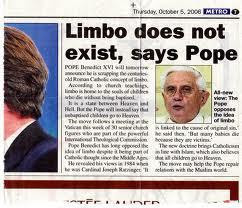LIMBO
(Late Latin limbus) a word of Teutonic derivation, meaning literally "hem" or "border," as of a garment, or anything joined on (cf. Italian lembo or English limb).
In theological usage the name is applied to (a) the temporary place or state of the souls of the just who, although purified from sin, were excluded from the beatific vision until Christ's triumphant ascension into Heaven
(the "limbus patrum"); or (b) to the permanent place or state of those
unbaptized children and others who, dying without grievous personal sin, are excluded from the beatific vision on account of original sin alone (the "limbus infantium" or "puerorum").
Pope Benedict XVI authorized publication of this document, indicating that it is considered consonant with the Church's teaching, though it is not an official expression of that teaching.[28] Media reports that by the document "the Pope closed Limbo"[29] are thus without foundation. In fact, the document explicitly states that "the theory of limbo, understood as a state which includes the souls of infants who die subject to original sin and without baptism, and who, therefore, neither merit the beatific vision, nor yet are subjected to any punishment, because they are not guilty of any personal sin. This theory, elaborated by theologians beginning in the Middle Ages, never entered into the dogmatic definitions of the Magisterium, even if that same Magisterium did at times mention the theory in its ordinary teaching up until the Second Vatican Council. It remains therefore a possible theological hypothesis" (second preliminary paragraph); and in paragraph 41 it repeats that the theory of Limbo "remains a possible theological opinion". The document thus allows the hypothesis of a limbo of infants to be held as one of the existing theories about the fate of children who die without being baptised, a question on which there is "no explicit answer" from Scripture or tradition.[28] These theories are not official teaching of the Catholic Church, but are only opinions that the Church does not condemn, permitting them to be held by its members.
Some traditionalist Catholics have seen publication of the Commission's study as a move "to overturn and spread confusion in the most fundamental doctrines of the Faith so as to promote the damnation of souls".[30]
19 Now the works of the flesh are manifest, which are [these]; Adultery, fornication, uncleanness, lasciviousness,
20Idolatry, witchcraft, hatred, variance, emulations, wrath, strife, seditions, heresies,
21 Envyings, murders, drunkenness, revellings, and such like: of the which I tell you before, as I have also told [you] in time past, that they which do such things shall not inherit the kingdom of God.(Gal.5:20-21)




Comments
Post a Comment